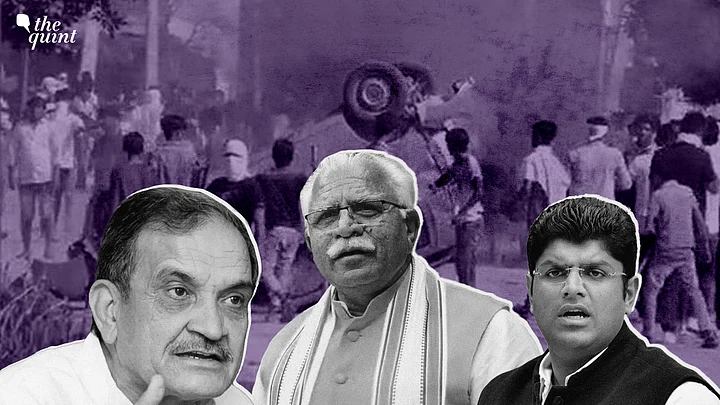The violence in Haryana's Nuh which subsequently spread to Sohna and parts of Gurugram, seems to have brought forth the differences in the ruling BJP-JJP coalition in the state.
There are different voices coming from even within the Haryana BJP.
The differing versions are focused on the Brij Mandal Jalabhishek Yatra - also called Shobha Yatra - that took place on Monday, after which the violence had broken out.
Khattar and Chautala Differ on Yatra
On one hand, Haryana chief minister Manohar Lal Khattar, who is from the BJP, said that there was a conspiracy to target the Yatra. In effect, he pointed towards the locals in Nuh, most of them Muslims.
"The Yatra was a religious procession. It was targeted as part of a conspiracy," he said.
On the other hand, deputy chief minister and Jannayak Janata Party Dushyant Chautala has blamed the organisers of the Yatra - that is the Vishwa Hindu Parishad - and said that they didn't give a proper estimate of the the crowd to the administration.
He said that the violence could have been averted had the organisers given a proper estimation to authorities.
"The organisers of Monday’s event did not give proper information about the expected number of persons participating in the event. This seems to be the cause behind the widespread damage."Dushyant Chautala, deputy CM of Haryana
Chautala even went to the extent of praising the Muslims of Nuh, saying that they "stood with India during Mughal invasions as well as the Independence movement".
The JJP leader said that the culprits will be punished "even if they belong to a political party or a social organisation".
Rao Inderjit Singh Questions Yatra
Union minister and BJP MP from Gurugram, Rao Inderjit Singh, has questioned the use of weapons during the Shobha Yatra.
"Who gave weapons to them for the procession? Who goes to a procession carrying swords, or sticks? This is wrong. A provocation took place from this side too. I am not saying there was no provocation from the other side," Inderjit Singh said, speaking to The Indian Express.
Inderjit met PM Modi on Wednesday and even after the meeting, he reiterated his stance.
“This is a matter of probe as to how both sides got possession of these weapons and how such an atmosphere was created.”Rao Inderjit Singh after meeting PM Modi
What Explains the Different Versions?
Dushyant Chautala's stand is being seen as part of the growing distance between the BJP and the JJP in Haryana.
The JJP has been uncomfortable with the BJP's stand on the farmers' protest and the wrestlers' protest.
Another bone of contention between the two parties is seat-sharing for the Lok Sabha elections, especially the Hisar and Sirsa Lok Sabha seats, both held by the BJP.
Hisar has been a tradtional seat of the Chautala family but in 2019 the seat was won by Brijendra Singh of the BJP.
Brijendra is the son of Chaudhary Birender Singh, who was earlier in the Congress. Their family's political rivalry with the Chautalas is well known.
If there has to be seat-sharing between the two parties, the BJP will have to at least part with Hisar and maybe even Sirsa, which also falls in the JJP's core area of influence.
But there is another aspect to Dushyant Chautala's stand - which is the general alienation of the Jat community from the BJP due to a number of agitations - the Jat reservation protest, the farmers' protest and the wrestlers' protest. Rural Jat voters are the primary base of the JJP.
In the context of the Nuh violence, Jat groups have maintained a clear distance from the efforts of Hindutva organisations to mobilise a 'united Hindu response'. In fact, in Jat groups on social media, memes and jokes about the community's 'neutrality' in the current violence are doing the rounds.
The case of Rao Inderjit is different from Dushyant Chautala as the former is still within the BJP. Inderjit was earlier in the Congress and managed to get some support from the Muslims of Mewat even when he contested on a BJP ticket in 2014 and 2019.
His stand reflects his desire to maintain some standing among that section. There also seems to be a fear that the BJP could potentially replace him with a more hardline candidate in the 2024 elections.
However, Rao Inderjit's meeting with PM Modi on 2 August would end rumours of any possible differences.
(At The Quint, we question everything. Play an active role in shaping our journalism by becoming a member today.)
